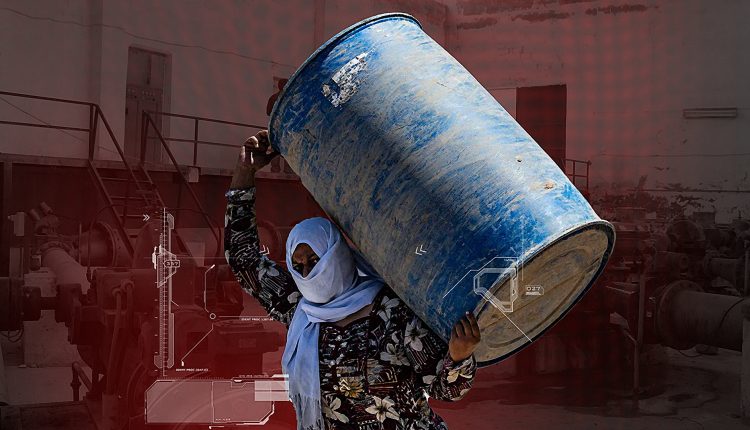As Turkey continues its attacks on northern and eastern Syria, including by cutting off the water supply, hundreds of people are falling ill every day as a result of the water cuts. In its ongoing attacks on northeastern Syria, the Turkish state is systematically targeting the substructures of civilian settlements in an attempt to drive out the local population and occupy other areas.
The Turkish state has again bombed a water supply network in the north-east of Syria. According to local reports, Turkish forces attacked the village of Merzi in the town of Zirgan in the Heseke canton last week. The Turkish bombing targeted the village’s water supply network, causing material damage.
Disaster area
On the third of July, the Water Directorate in the Heseke district declared all cities, villages and towns in the district a disaster area due to the ongoing water shortage. The Water Directorate pointed out that the continuation of the disaster is the result of the agreement between Russia, Turkey and the Syrian regime to suffocate the people of northeastern Syria and erase their democratic experience.
In November 2022, Human Rights Watch (HRW) had already issued an urgent appeal to the international community to end the water crisis in the region. In its statement, HRW said the Turkish authorities are exacerbating an acute water crisis that is believed to have led to the deadly cholera outbreak that is spreading across Syria and into neighboring countries. The organization called on all parties to the conflict to ensure the right to clean water and health for everyone in Syria.
Water as a weapon
A week ago, members of the Water Authority and the Democratic Civil Administration in Tabqa gave a statement about the water shortage in the region. The press statement was read out by Hemud Şêx, Co-Chair of the Tabqa Water Department, who stressed that the Turkish state continues to use water resources as a weapon while using all inhumane measures against northeastern Syria. Şêx pointed out that the Turkish state continues to violate agreements on the water of the Euphrates, resulting in the lowering of dams and lakes, including the Tabqa Dam, which has lost 4 billion cubic meters of water as a result of these practices.
Measures are currently being taken by the Syrian Democratic Forces (SDF) and their allies, the People’s Protection Units (YPG and YPJ). The SDF is distributing water in the northern Syrian town of Heseke and surrounding villages.
Poisoning and diseases
Since the occupation of Serekaniye in 2019, the Turkish state has used its control over the waterworks as a weapon against the people of the autonomous region in northern and eastern Syria. The Elok pumping station, vital for one and a half million people, has been shut down dozens of times. Since 3 July, the pumps have been out of action again, threatening a humanitarian disaster for Heseke.
At the end of July 2023, Ehmed Ferhan, head of the ambulance service at the Heseke People’s Hospital, told the ANHA news agency: “Every day, dozens of people suffering from poisoning and skin diseases come to the hospital because of the water pollution in Heseke.”
A young woman died due to extreme heat
The extreme heat also affecting northern and eastern Syria has caused the death of a young woman, Khadija Mohammad Konehir (in Kurdish: Xedîce Mihemed Kinêhir), from the Heseke canton. Doctors are warning people not to go out during the hottest hours and to protect children, the sick and the elderly. This illustrates the scale of the scorching heat, as well as the threat to human life caused by water shortages.
The statement concluded by calling on the United Nations to play an effective role in preventing the Turkish state from continuing its war crimes against its people.

